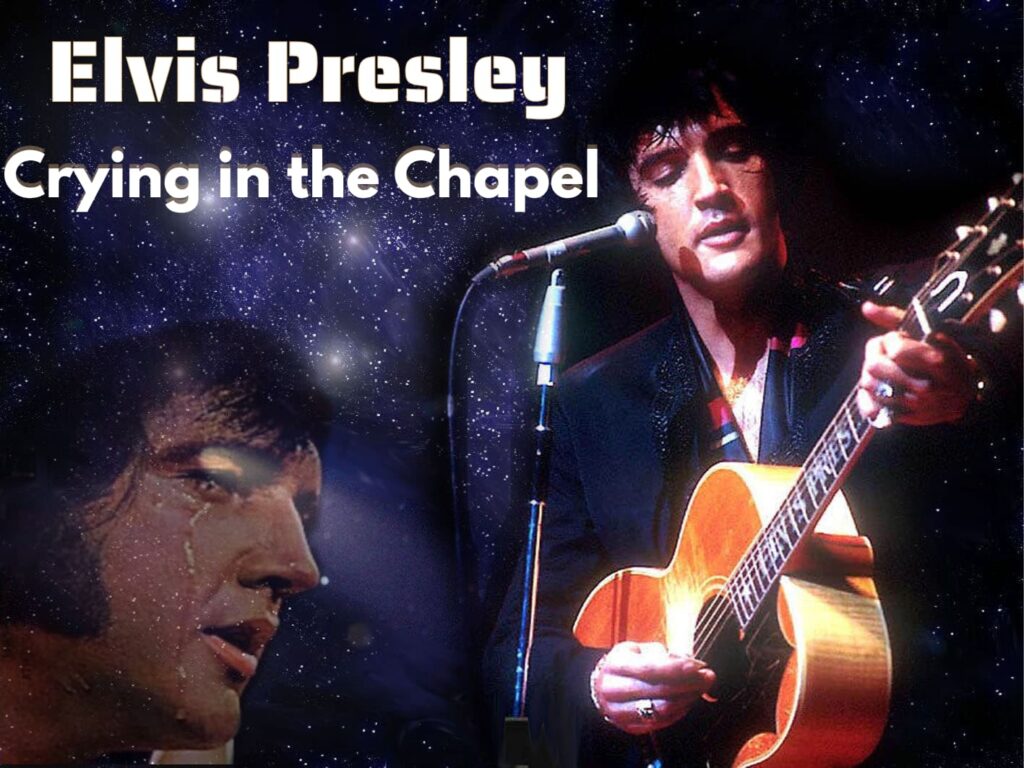
A Spiritual Balm for Troubled Times
Ah, Elvis Presley’s “Crying in the Chapel.” Just hearing those words conjures up a specific era, doesn’t it? A time when melodies often carried a deeper resonance, a spiritual yearning that spoke to the soul. This wasn’t just another hit; it was a phenomenon, a song that transcended the usual pop charts to become something far more significant, especially for those of us who remember its initial impact.
When “Crying in the Chapel” finally saw its official release as a single in April 1965, it wasn’t just a modest success – it soared. For those of us who recall patiently waiting for the weekly radio countdowns, its ascent felt almost preordained. It climbed steadily up the Billboard Hot 100, ultimately peaking at an impressive number 3. But its reach extended far beyond the mainstream pop charts. It was a dominant force on the Easy Listening charts, where it spent a remarkable seven weeks at number 1, a testament to its widespread appeal and comforting message. And let’s not forget its international acclaim; in the UK, it also reached number 1, cementing its status as a global phenomenon. For a song recorded so many years prior, its eventual success was a vindication, a recognition of its timeless quality.
The story behind “Crying in the Chapel” is, in itself, a fascinating footnote in the King’s illustrious career, and one that speaks volumes about the shifting sands of the music industry and Elvis’s own artistic journey. Elvis actually recorded this gospel hymn way back in 1960, during the sessions for his album His Hand in Mine. At that time, his manager, the astute yet often controlling Colonel Tom Parker, made the somewhat curious decision not to release it as a single. Perhaps he felt it didn’t quite fit the rock and roll image Elvis was then cultivating, or maybe he was simply holding it back, sensing its potential for a later, more impactful moment. For five long years, this beautiful, soul-stirring recording sat in the vaults, a hidden gem waiting for its moment to shine.
It wasn’t until 1965, when RCA Victor, perhaps recognizing the growing demand for more spiritually themed music or simply seeing an opportunity, decided to finally release it. And what a release it was! Its gentle melody and heartfelt lyrics offered a solace that resonated deeply with a public often grappling with the uncertainties and rapid changes of the mid-1960s. This wasn’t the raucous, hip-swiveling Elvis of “Hound Dog” or “Jailhouse Rock”; this was a more contemplative, vulnerable Elvis, one who embraced the spiritual side of his musical heritage.
The meaning of “Crying in the Chapel” is, on the surface, quite clear. It’s a song of repentance, of seeking spiritual solace and redemption within the walls of a church. It speaks to the universal human experience of seeking comfort and forgiveness in times of distress or reflection. The lyrics paint a picture of someone finding peace and understanding through faith, a common theme in gospel music, which Elvis deeply cherished and often returned to throughout his career. For many, it became an anthem of hope and renewal, a gentle reminder that even in our darkest hours, there is a place of refuge and solace to be found.
But beyond its literal interpretation, “Crying in the Chapel” also serves as a poignant reminder of Elvis Presley’s own profound connection to gospel music. Long before he became the global rock and roll icon, Elvis found his voice and his passion in the hymns and spirituals he sang in church. This genre wasn’t just a sideline for him; it was the bedrock of his musical foundation, a source of comfort and inspiration that he returned to repeatedly, especially in his later years. When you listen to “Crying in the Chapel,” you’re not just hearing a pop star singing a religious song; you’re hearing Elvis coming home, returning to the roots that nurtured his extraordinary talent. It’s a testament to the fact that beneath the glitz and the glamour, there was always a deeply spiritual man, one who found profound meaning and expression in the hymns of his youth. It’s a beautiful, timeless piece, and one that continues to touch hearts generations later.